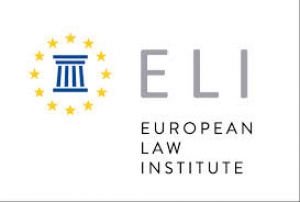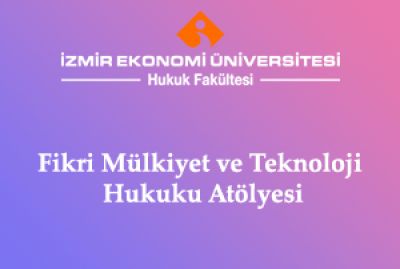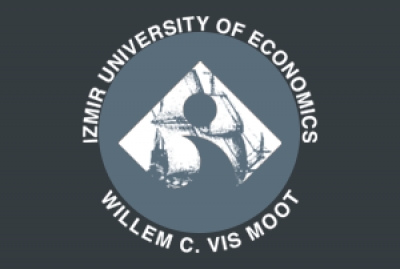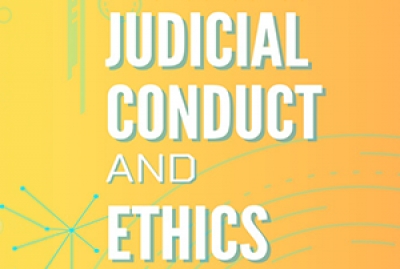
Faculty of Law
HUK 300 | Course Introduction and Application Information
| Course Name |
Law of Notaries
|
|
Code
|
Semester
|
Theory
(hour/week) |
Application/Lab
(hour/week) |
Local Credits
|
ECTS
|
|
HUK 300
|
Fall/Spring
|
3
|
0
|
3
|
4
|
| Prerequisites |
None
|
|||||
| Course Language |
Turkish
|
|||||
| Course Type |
Elective
|
|||||
| Course Level |
First Cycle
|
|||||
| Mode of Delivery | - | |||||
| Teaching Methods and Techniques of the Course | - | |||||
| Course Coordinator | ||||||
| Course Lecturer(s) | ||||||
| Assistant(s) | ||||||
| Course Objectives | The aim of this course is to introduce the notary profession, the legal regulations related to the profession, especially the Notary Law, the Law of Civil Procedure and the relevant provisions of the Turkish Penal Code, together with the basic principles and rules to be informed about the field. |
| Learning Outcomes |
The students who succeeded in this course;
|
| Course Description | In this course, the qualification of the notary profession, the rights and powers of notaries; its obligations and responsibilities shall be examined in terms of its legal, criminal and disciplinary dimensions and its relations with the professional organization and its rights and obligations in this context shall also be evaluated. |
|
|
Core Courses | |
| Major Area Courses |
X
|
|
| Supportive Courses | ||
| Media and Management Skills Courses | ||
| Transferable Skill Courses |
WEEKLY SUBJECTS AND RELATED PREPARATION STUDIES
| Week | Subjects | Related Preparation |
| 1 | The Definition and Legal Quality of Notaryship | It is mandatory to introduce a Notary Law in the courses. In addition, HMK and CK may need to be brought to the extent required. |
| 2 | Establishment, classification of notaryship public and authority environment | It is mandatory to introduce a Notary Law in the courses. In addition, HMK and CK may need to be brought to the extent required. |
| 3 | Features of Notaryship | It is mandatory to introduce a Notary Law in the courses. In addition, HMK and CK may need to be brought to the extent required. |
| 4 | Requirements for Admission to The Profession and Entry to The Profession | It is mandatory to introduce a Notary Law in the courses. In addition, HMK and CK may need to be brought to the extent required. |
| 5 | Appointment to a notaryship and inauguration of appointmented noteryship | It is mandatory to introduce a Notary Law in the courses. In addition, HMK and CK may need to be brought to the extent required. |
| 6 | End of notaryship | It is mandatory to introduce a Notary Law in the courses. In addition, HMK and CK may need to be brought to the extent required. |
| 7 | Professional organization in terms of notaryship | It is mandatory to introduce a Notary Law in the courses. In addition, HMK and CK may need to be brought to the extent required. |
| 8 | Midterm | |
| 9 | The notary office and the books to be kept there | It is mandatory to introduce a Notary Law in the courses. In addition, HMK and CK may need to be brought to the extent required. |
| 10 | Notary office employees and their status, notary publics | It is mandatory to introduce a Notary Law in the courses. In addition, HMK and CK may need to be brought to the extent required. |
| 11 | The transfer and discharge of the notaryship | It is mandatory to introduce a Notary Law in the courses. In addition, HMK and CK may need to be brought to the extent required. |
| 12 | The structure and functioning of the notary assosiation | It is mandatory to introduce a Notary Law in the courses. In addition, HMK and CK may need to be brought to the extent required. |
| 13 | Union of Notaries and its bodies | It is mandatory to introduce a Notary Law in the courses. In addition, HMK and CK may need to be brought to the extent required. |
| 14 | Union of Notaries and its bodies | It is mandatory to introduce a Notary Law in the courses. In addition, HMK and CK may need to be brought to the extent required. |
| 15 | Review of the semester | |
| 16 | Final Exam |
| Course Notes/Textbooks | |
| Suggested Readings/Materials |
EVALUATION SYSTEM
| Semester Activities | Number | Weigthing |
| Participation | ||
| Laboratory / Application | ||
| Field Work | ||
| Quizzes / Studio Critiques |
1
|
10
|
| Portfolio | ||
| Homework / Assignments |
1
|
10
|
| Presentation / Jury | ||
| Project | ||
| Seminar / Workshop | ||
| Oral Exams | ||
| Midterm |
1
|
30
|
| Final Exam |
1
|
50
|
| Total |
| Weighting of Semester Activities on the Final Grade |
3
|
50
|
| Weighting of End-of-Semester Activities on the Final Grade |
1
|
50
|
| Total |
ECTS / WORKLOAD TABLE
| Semester Activities | Number | Duration (Hours) | Workload |
|---|---|---|---|
| Theoretical Course Hours (Including exam week: 16 x total hours) |
16
|
3
|
48
|
| Laboratory / Application Hours (Including exam week: '.16.' x total hours) |
16
|
0
|
|
| Study Hours Out of Class |
0
|
||
| Field Work |
0
|
||
| Quizzes / Studio Critiques |
1
|
11
|
11
|
| Portfolio |
0
|
||
| Homework / Assignments |
1
|
11
|
11
|
| Presentation / Jury |
0
|
||
| Project |
0
|
||
| Seminar / Workshop |
0
|
||
| Oral Exam |
0
|
||
| Midterms |
1
|
20
|
20
|
| Final Exam |
1
|
30
|
30
|
| Total |
120
|
COURSE LEARNING OUTCOMES AND PROGRAM QUALIFICATIONS RELATIONSHIP
|
#
|
Program Competencies/Outcomes |
* Contribution Level
|
||||
|
1
|
2
|
3
|
4
|
5
|
||
| 1 | To be able to possess the knowledge in legal terminology, concepts and principles. |
X | ||||
| 2 | Solves the legal problems with an analytic and integral point of view. |
X | ||||
| 3 | Evaluates the legal knowledge and abilities obtained with a critical approach. |
X | ||||
| 4 | Evaluates the developments in legal theory and practice by monitoring local, international and interdisciplinary dimensions. |
X | ||||
| 5 | Is conscious of social, professional and scientific principles of ethic behaviour. |
X | ||||
| 6 | Takes responsibility in solving problems by creative and innovative thinking. |
X | ||||
| 7 | Interprets the sources of law by ways of legal methodology. |
X | ||||
| 8 | To be able to interpret the legal norms with a sense of justice respectful to human rights and in the light of principles of democratic, secular and social state of law. |
X | ||||
| 9 | To be able to use the daily scientific sources and court judgments in the framework of life time learning approach. |
X | ||||
| 10 | Informs the related persons and institutions about legal matters both verbally and in written. |
X | ||||
| 11 | Monitors the daily legal information/court decisions and interacts with the colleagues in a foreign language (“European Language Portfolio Global Scale” Level B1). |
|||||
| 12 | Uses the information and communication technology together with the computer programs in a level required by the area of law (“European Computer Driving Licence, Advanced Level”). |
|||||
*1 Lowest, 2 Low, 3 Average, 4 High, 5 Highest
NEWS |ALL NEWS

The only team from Izmir
Izmir University of Economics (IUE) Faculty of Law students Arda Ataoğuz, Göktuğ Şirin and Ömer Ateş represented our country in Willem C.
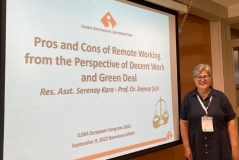
Joint paper of res. asst. Serenay Kara and Prof. Dr. Zeynep Şişli was presented at ILERA European Congress 2022

Dr. Ebru Akduman gave seminars at Niccolo Cusano University, Rome on European Union-Turkey Relations.

‘Mock trial’ brought an award
Oğuzhan Yıldırım, İnan Bakır and Süleyman Gürkan Emre, students of Faculty of Law, Izmir University of Economics (IUE), won the third prize
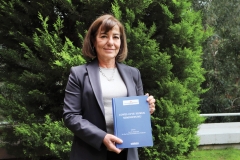
They wrote the book of corona law
Izmir University of Economics (IUE) Faculty of Law, which organized a symposium to clarify different issues such as "protection of personal data",





